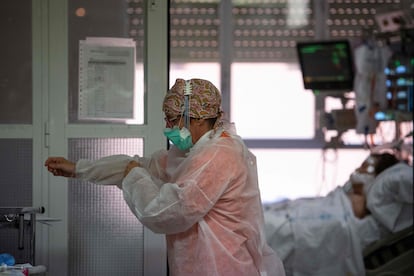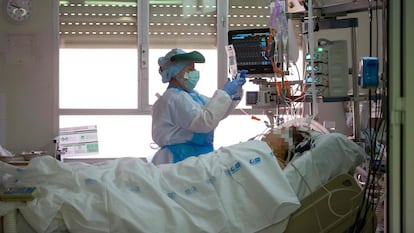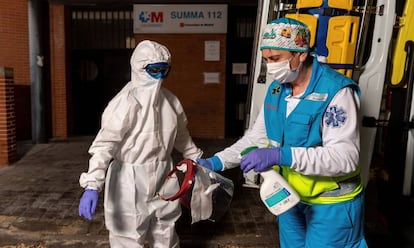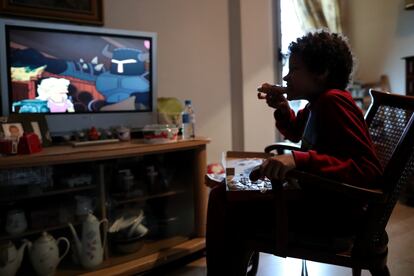Daily coronavirus deaths in Spain stabilize: 185 in 24 hours
Authorities express confidence that the country will be able to move to the next phase of the deescalation plan after fewer than 200 deaths were reported for the third straight day

Official figures from the Health Ministry released on Tuesday showed that there were 185 coronavirus-related fatalities in the last 24 hours. This is the third day in a row that Spain has recorded fewer than 200 fatalities. On Monday and Tuesday, 164 fatalities were registered.
In recent weeks, an uptick in the numbers has come to be expected on Tuesdays, given that figures tend to be underreported on weekends due to the lack of personnel. But this rise is in keeping with the overall downward trend of the outbreak.
Speaking at the government’s daily press conference, Fernando Simón, the director of the Health Ministry’s Coordination Center for Health Alerts and Emergencies, said: “We no longer have any doubt about the trend.”
These are positive figures, we are in a good position for the transitionFernando Simón, Coordination Center for Health Alerts and Emergencies
“These are positive figures, we are in a good position for the transition [to what the government is calling “the new normality”]. It gives us the confidence that more territories can pass into the next phase [of the deescalation plan].”
According to the latest data, there were 867 new infections as confirmed by the more reliable PCR tests, compared to 356 on Monday. The number of daily intensive care unit (ICU) admissions also rose. In the past 24 hours, 37 patients were admitted to an ICU compared to 21 on Monday, while hospitalizations increased from 394 to 720 on Tuesday. But these figures are below the 49 ICU admissions and 908 hospitalizations recorded 10 days ago.
Since the crisis began, there have been a total of 219,329 infections in Spain confirmed by PCR tests, while 123,486 patients have recovered. The total number of official coronavirus-related deaths in Spain now stands at 25,613.
Infections spike among health workers
The number of health workers who have contracted the coronavirus has risen 39% in the past two weeks, according to figures released on Monday by the Spanish Health Ministry. A total of 43,325 health workers have now been infected since the beginning of the outbreak. What’s more, the figures show that these professionals make up more than half of new coronavirus cases in Spain.

“We are very worried about this information,” said Serafín Romero, the president of Spain’s Medical Colleges Organization, which represents medical associations across the country. “Nearly 20% of confirmed cases are professionals from the sector. That is 10 percentage points more than in Italy and far higher than other European countries, as well as South Korea.”
Sources from hospitals and primary healthcare providers in four Spanish regions said that this is just “the tip of the iceberg.” According to these sources, many health workers are still waiting to be tested to see whether they are carrying the virus or have already recovered from the infection.
Last week, the Health Ministry reported 8,546 cases as confirmed by the more reliable PCR tests. Of this figure, 5,331 were health workers. Although it may appear that health workers make up two-thirds of all new infections (62%), the Health Ministry has admitted that it does not know the exact percentage, given that some regions include cases that have been confirmed by the less-precise serological tests.
Madrid hospitals lack testing protocol
The Madrid region reported its first case of Covid-19 on February 25. Two months later, many health workers have still not received either a PCR or serological test – even though some have been in quarantine after presenting coronavirus symptoms. Nor is there a unified testing protocol for hospitals and health centers in the region. With respect to fast testing, “each one is doing it in their own way,” according to Spanish labor union CCOO. For example, in some centers testing is voluntary, in others cleaning staff are also tested, while some hospitals are not planning on carrying out the fast tests because they believe they are not reliable enough.

Meanwhile, there continue to be problems with personal protective equipment (PPE). After receiving a shipment of faulty face masks, which forced a thousand health workers across Spain to go into isolation, doubts remain about the quality of some of the PPE in use. Several health workers from the Príncipe de Asturias hospital in Alcalá de Henares, for example, say that they were given gloves that did not meet safety norms.
Vulnerable children in Madrid will continue to receive fast-food meals
In the Madrid region, 11,500 children from families on a subsistence income (RMI) are offered subsidized school meals. But when schools in the region closed on March 11, the regional government decided to break its contract with the catering companies that provided meals at school cafeterias, and instead reached agreements with the Telepizza, Rodilla and Viena Capellanes chains, which sell fast-food, sandwiches and other snacks, and baked goods, respectively.

The premier of Madrid, Isabel Díaz Ayuso of the conservative Popular Party (PP), defended the move last week, arguing that “100% of children love” pizzas.
The decision, however, sparked widespread criticism from nutritionists and parents, who claimed some children had put on as much as six kilos from eating the meals for the past 54 days of lockdown.
Spanish basketball stars Pau and Marc Gasol wrote to the Madrid premier on Monday to express their concern over the “short-, medium- and long-term health consequences on boys and girls in vulnerable situations.” The letter from the brothers’ Gasol Foundation called on the regional government to “look for alternatives that guarantee healthy meals during this period of exception.”
Ayuso replied on Tuesday that the government would look for alternatives, but not before the end of the school year in June. This means that vulnerable children will continue to receive fast-food meals until schools reopen in three months’ time in September.
English version by Melissa Kitson.
Tu suscripción se está usando en otro dispositivo
¿Quieres añadir otro usuario a tu suscripción?
Si continúas leyendo en este dispositivo, no se podrá leer en el otro.
FlechaTu suscripción se está usando en otro dispositivo y solo puedes acceder a EL PAÍS desde un dispositivo a la vez.
Si quieres compartir tu cuenta, cambia tu suscripción a la modalidad Premium, así podrás añadir otro usuario. Cada uno accederá con su propia cuenta de email, lo que os permitirá personalizar vuestra experiencia en EL PAÍS.
¿Tienes una suscripción de empresa? Accede aquí para contratar más cuentas.
En el caso de no saber quién está usando tu cuenta, te recomendamos cambiar tu contraseña aquí.
Si decides continuar compartiendo tu cuenta, este mensaje se mostrará en tu dispositivo y en el de la otra persona que está usando tu cuenta de forma indefinida, afectando a tu experiencia de lectura. Puedes consultar aquí los términos y condiciones de la suscripción digital.








































